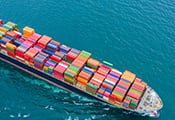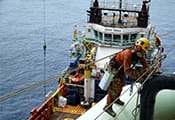Insure Your Goods in Transit - ₹10 Lakh Cover at ₹591+ only!


Marine insurance covers loss or damage during the transfer of property from origin to destination, including ships, goods, terminals and various transportation modes. Cargo insurance is a subset of marine insurance, which also encompasses onshore and offshore exposed property (like container terminals, ports, oil platforms, and pipelines), hull, marine casualty, and marine liability. The coverage spans from the carrier's departure to its arrival. Apart from sea, marine insurance covers loss or damage through rail, road and air as well.
Marine insurance is often thought of as coverage for shipping goods by sea. However, it offers more than that. Marine insurance policies also protect goods during transportation by rail, road, and air.
Premium starts from
₹**,**00
Add your details to see the full price
Premium starts from
₹1,319
(Excluding GST)No online plans found!
But, we have offline plans ready. Connect with our advisor to explore more
Here are the inclusions and exclusions of the Marine Insurance policy:
*To learn about the coverage in detail, refer to the policy documents provided by the insurer
**These perils are covered under the All-risk insurance policy, But if you have a basic or different policy, contact your insurance provider to know the specific coverage details.
*To learn about the exclusions in detail, refer to the policy documents provided by the insurer.
**Understanding these limitations, exclusions, and exceptions is essential when considering marine insurance coverage. It is crucial to carefully review the policy terms and conditions to ensure that the coverage meets the specific needs and requirements of the insured party. The exclusions vary from one kind of marine insurance policy to another.


Marine Cargo Insurance provides coverage for goods transported through various modes, including:
Here are some of the features of a marine cargo insurance policy:
*Remember that the actual features and services offered by insurance providers can vary, so customers need to review policy documents and consult with insurance representatives to understand the specific features and benefits of their marine insurance coverage.

Here are the different types of marine cargo insurance policies available, tailored to specific requirements, but the specifics can differ from one insurance company to another.
| Types of Plans Under Marine Insurance | Clause/Extent of Coverage | Geographical Classification |
| Single | * A: All Risk: All risks except rainwater damage. * B: Basic: Accidental Damage |
Inland: Transit within Indian border. Import: Transit from anywhere in the world to India. Export: Transit from India to anywhere in the world. |
| Annual Open | ||
| STOP | ||
| Hull | Coverage for the vessel only (Truck, Ship, Train, Airplane) |
Cargo insurance / Transit insurance provides coverage for the transportation of goods from origin to destination. There are three types of plans under cargo insurance that you can purchase as per your requirement, for the number of transits and kind of coverage you want in your policy. They are as follows:
An Annual Open policy is a type of marine insurance policy that offers continuous and comprehensive protection for cargo during multiple shipments throughout the year. It's a convenient and cost-effective choice for businesses engaged in regular shipping, as it covers goods on various trips within the specified one-year period, unlike Single Transit Insurance, which only applies to a single journey.
Single Transit Insurance in marine insurance is a type of coverage that protects goods or cargo during a specific single transit or voyage. It is designed to cover the cargo while it is being transported from one location (the origin) to another location (the destination) via a vessel such as a truck, train, ship or plane.
The Marine Sales Turnover Policy offers insurance coverage for the projected annual sales turnover of a company engaged in marine transportation. This policy safeguards the company's financial interests by protecting against potential losses or damages during its operations.
For example, In FY 2023, if a company plans to export goods worth Rs 100 crore and import goods worth Rs 50 crore, they can opt for a STOP policy. The insurance company will calculate the premium based on the Rs 100 crore estimated sales. However, the coverage provided to the insured will be for both the Rs 100 crore export and Rs 50 crore import, totaling Rs 150 crore for potential loss or damage.
Hull insurance provides extensive coverage for damages to the hull, machinery, and equipment of a vessel. It protects shipowners from financial losses due to risks like collisions, groundings, fires, and storms, ensuring the safety of their maritime assets.
There are two types of Marine insurance clauses. They are as follows:
ITC stands for Inland transit clauses and it is for inland transits within the borders of India only. Whereas ITC-A covers all damages except rainwater damage and ITC-B covers only accidental damages. This clause will apply to inland transits.
ICC stands for International cargo clauses and it is for international cargo only. Whereas ICC-A covers all damages except rainwater damages and ICC-B covers accidental damages only. This clause will apply to the import and export.


Be it a single transit, annual open or annual sales turnover policy, there is a geographical limit under each marine cargo insurance policy. These classifications specify the origin and destination points of the insured transportation. They are as follows:
Inland marine insurance policy provides coverage for the transportation of goods from one place to another within the Indian border. This policy mostly covers transportation by road and rail.
A marine insurance policy offers coverage for imports from any global location to India. This type of policy mostly covers transit modes of sea and air.
A marine insurance policy offers coverage for exports from any location in India to worldwide destinations. This policy also mostly covers transit modes of sea and air.
In the below grid, take a look at the different insurance companies providing Marine Insurance plans in India:
| Insurer | Claim Settlement Ratio |
| Cholamandalam Marine Insurance | 90% |
| IFFCO Tokio Marine Insurance | 98.79% |
| Liberty Videocon Marine Insurance | 72.52% |
| Magma HDI Marine Insurance | 78.38% |
| National Marine Insurance | 72.01% |
| New India Assurance Marine Insurance | 86.17% |
| Oriental Marine Insurance | 93.08% |
| Royal Sundaram Marine Insurance | 74.48% |
| SBI General Marine Insurance | 75.51% |
| Tata AIG Marine Insurance | 73.40% |
| Universal Sompo Marine Insurance | 84.03% |
Disclaimer: Claim settlement ratio refers to the percentage of claims settled out of the raised claims by the insured. Above mentioned are arranged in alphabetical order. Policybazaar.com does not endorse, rate, or recommend any particular insurer or insurance product offered by an insurer.
The premium for Marine Cargo Insurance is determined based on factors such as the value of the goods, the nature of the cargo, the chosen route, the claim history, the fitness of the cargo, and the insurer's assessment.
| Cover Amount | All Risk Cover Premium | Basic Cover Premium |
| 10,000 upto 20 lacs | ~Rs 1,180 | ~Rs 701 |
| 20 Lacs - 50 Lacs | ~Rs 1,240 - 2,950 | ~Rs 818 - 1950 |
| 50 Lacs-75 Lacs | ~Rs 3,010 - 4,425 | ~Rs 1,986 - 4,425 |
| 75 Lacs- 1 Cr | ~Rs 4,484 - 5,900 | ~Rs 2,959 - 3,894 |
| 1 Cr - 2.5 Cr | ~Rs 6,000 - 14,750 | ~Rs 3,900 - 13,275 |
| 2.5 Cr - 5 Cr | ~Rs 14,750 - 29,500 | ~Rs 13,275 - 26,550 |
*Disclaimer - These are tentative prices subject to change according to commodities and insurers.
Here is the formula that is used to calculate the premium of your marine insurance policy:
Premium = Rate (Commodity/Goods) * Sum insured / 100 + (GST)
The Marine Insurance Act of 1963 is a legislative act applied in India that governs marine insurance. It provides regulations and guidelines for marine insurance policies, covering the protection of goods and vessels/vehicles through rail road, air and sea.
The act defines the responsibilities of insurers and the process of evaluating losses or damages that occur during marine voyages. Its main objective is to promote fairness and uniformity in the marine insurance sector.
The principles of marine insurance are fundamental guidelines and concepts that govern the operation and application of marine insurance policies. These principles help establish a fair and effective insurance system for maritime risks. The main principles of marine insurance include:
Suppose the customer purchased the insurance policy on 1st January 2023
And the transport begins on 2nd January 2023
Then the insurance policy will provide coverage for the loss or damage of the goods carried by any transportation mode.
If the transportation begins before the inception of the policy then risk would not be covered under the captioned policy.


Follow the steps below to raise the claim under marine insurance through Policybazaar for Business:
Promptly inform your assigned relationship manager about the incident.
Fill out and return the provided claim form as instructed.
Upon assessment of the details provided by you, your claim will be registered and a claim reference number will be issued.
After claim registration, the insurer will appoint a surveyor.
After claim registration, the insurer will appoint a surveyor. Document Submission: The surveyor will provide a list of required documents following their survey. Submit all necessary documents as per the surveyor’s instructions and await processing.
Once approved, the insurance company will disburse the claim amount.
Note: The insurer will thoroughly review the terms and conditions of your policy to assess the coverage applicability regarding the claimed incident. Consequently, the determination of claim acceptance or rejection will be at the discretion of the insurer.
Once the claim is successfully filed the insurer will provide the URN/claim number, which can be used for uploading documents and checking the insurance claim status.
Below is the list of documents that are required for the claim process:
*Enter URN/Claim number provided by insurer to check claim status.
Here are the initial requirements you will need to provide when purchasing the marine insurance policy from Policybazaar for Business:
*In a single transit insurance policy, the customer can purchase the policy before the beginning of the transportation.
*The buying process can be completed within an hour or so once these requirements are fulfilled by the customer.
Alternatively, you can connect with risk consultants at Policybazaar for Business to clarify your doubts.
































Your call has been scheduled successfully.
 Expert advice made easy
Expert advice made easy


Our experts will reach out to you on Today between 2:00 PM - 3:00 PM
Only certified Policybazaar expert will assist you
*Savings of 42% are based on the comparison between the highest and lowest premiums for a Rs 50 lakh sum insured under Inland Transit Clause B or Institute Cargo Clause B for single transit cover of auto spare parts with shipment type of Inland(Domestic) and road as mode of transport.
By clicking on "Check Premium Now" you agree to our Privacy Policy and Terms Of Use and also provide us a formal mandate to represent you to the insurer and communicate to you the grant of a cover.
The details of insurance coverage, inclusions and exclusions are subject to change as per solutions offered by insurance providers. The content has been curated based on the general practices in the industry. Policybazaar is not responsible for the factual correctness of these details.
Insurance
"Policybazaar for Business" is a brand under Policybazaar Insurance Brokers Private Limited | CIN: U74999HR2014PTC053454 | Registered Office - Plot No.119, Sector - 44, Gurugram, Haryana - 122001 | Registration No. 742, Valid till 09/06/2027, License category- Composite Broker
Policybazaar Insurance Brokers Private Limited CIN: U74999HR2014PTC053454 Registered Office - Plot No.119, Sector - 44, Gurugram - 122001, Haryana Tel no. : 0124-4218302 Email ID: care@policybazaar.com
Policybazaar is registered as a Composite Broker | Registration No. 742, Registration Code No. IRDA/ DB 797/ 19, Valid till 09/06/2027, License category- Composite Broker
Visitors are hereby informed that their information submitted on the website may be shared with insurers.Product information is authentic and solely based on the information received from the insurers.
BEWARE OF SPURIOUS PHONE CALLS AND FICTITIOUS / FRAUDULENT OFFERS IRDAI or its officials do not involve in activities like selling insurance policies, announcing bonus or investment of premiums. Public receiving such phone calls are requested to lodge a police complaint.
© Copyright 2008-2025 policybazaar.com. All Rights Reserved.
